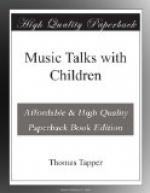It means to lead out what is within us. To lead music out of the heart becomes the object, then, of your lessons. One cannot drive music into you; it must be led out.
Where shall we look for music that it may be led out? Only in the heart. That is where all is in every one of us. But often in our hearts there is so much else, so much vanity, self-love, conceit, love for other things, that the music is almost beyond reach. Almost, but never entirely. In the heart of every one is music. But often it is deep, deep down, covered by these other things. The older we grow and the more other things we see and think about, the deeper and deeper down does the music get.
It is like heaping rocks, and dirt, and sticks on a bubbling spring. The spring is down there, bubbling freely beneath it all, still striving to be as free and as songful as before; but it cannot. People may come and go, may pass near to it, and hear not one of its sounds; they may never suspect that there is such a thing ready to go on merrily if it could.
When is the best time to lead water out of the spring, and music out of the heart? Before other things begin to cover it. With music the best time is in the early days, in childhood time—in the first days. We shall hear those words many times. Then little by little the bubbling spring of melody gains its independence; then, even if other things do come in, they cannot bury the music out of sight. The spring has been led forth and has grown stronger.
Thoughtful people who have suffered in learning—all people suffer in learning, thoughtful ones the most—wonder how they can make the task less painful for others. It will always cause us sorrow as well as joy to learn, and many people spend their lives in trying to have as little sorrow as possible come with the learning of the young. When such people are true and good and thoughtful and have infinite kindness, they are teachers; and the teachers impose tasks upon us severely, perhaps, but with kind severity. They study us and music, and they seek out the work each one of us must perform in order that we may keep the heart-springs pure and uncovered. Further than this, they find the way by which we shall lead the waters of life which flow out of the heart-springs. They find the way whither they should flow best.
Often in the doing of these things we find the lessons hard and wearisome, infinitely hard to bear, difficult, and not attractive. We wonder why all these things should be so, and we learn in the moment we ask that question that these painful tasks are the price we are paying for the development of our talent. That is truly the purpose of a lesson. And the dear teacher, wise because she has been painfully over the road herself, knows how good and necessary it is for us to labor as she directs.




